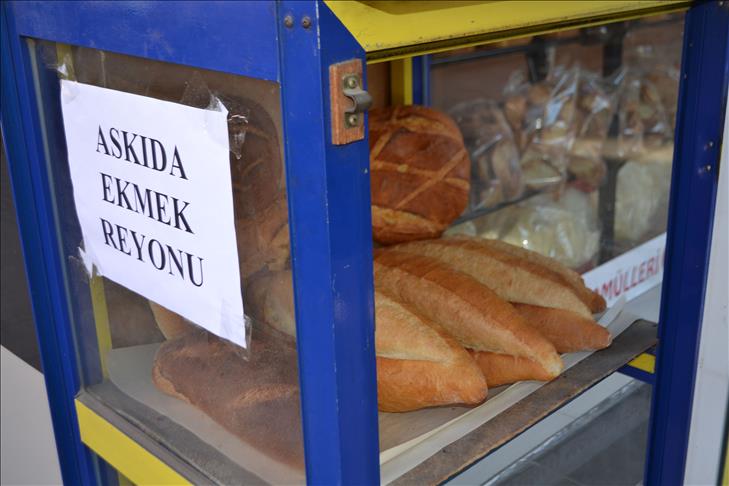
By Esra Kaymak
ISTANBUL
Robin Hood’s medieval career of robbing the rich to give to the poor saw him more than once facing the hangman’s noose. Now a recently revived Ottoman tradition of ‘hanging bread’ in Istanbul is also supporting those in need.
As ongoing austerity policies hit European citizens – leading to an explosion of so-called ‘food banks’ to support low-income families – a local authority in a crowded area of Istanbul is encouraging high or middle-income residents to pay for extra bread for their less-well-off neighbors, without the beneficiaries knowing who donated.
Taking its name from the hooks on which they were commonly stored, ‘hanging bread’ was revived in Istanbul's busy Bagcilar district last year during Ramadan. One hundred and forty bakeries across the area placed baskets and posters in their premises to be filled with paid-for loaves for the poor.
Residents pay for additional bread when shopping and leave the bakery. The baker than takes the sold or 'hanged’ bread' and leaves it in the charity basket, placed discreetly near the entrance of the store.
The project comes amid data from Turkey’s Statistical Institute which reveals that although average annual disposable income of Turkish households increased from 24,343 liras (US$11,422) in 2011 to 26,577 liras in 2012, there was a small rise in the proportion of the population living under the poverty line – just over 16%.
"Each day, 20-25 breads are hung in our bakery," says Hasan Huseyin Civil from Guneli bakery in Bagcilar, claiming that this amount doubled during the holy month of Ramadan.
Religion plays a strong part in this practice. While I was interviewing Civil, an elderly man entered the bakery to buy bread for not only himself but for “someone else”. Cevat Keles told me he always was leaving bread on a 'hanger', adding that Islam taught that sharing was a must for every believer.
Another baker Hatice Guldal from Aksu bakery in the same district, states that although many people were aware of the project the supply of hanged bread was not enough to meet demand.
"Mostly, young people leave breads in the morning and older ones take them in the evening [...] Sometimes, the amount of 'hanged bread' is 25 but sometimes it is only 10," she said.
Guldal stresses: "We have five permanent clients of the hanged bread, who come to the bakery each day."
Among those using the service was seven-year-old, Enes, who entered the bakery to take two breads from the charity basket. Hesitant and nervous, he rushes to get the bread and tries to leave immediately.
He tells me that his mother wanted him to come and ‘buy’ bread but pointing to Guldal says: "I wanted to pay but she did not take the money."
Guldal admits the child and his family are in a difficult situation and real need, but still wanted to pay.
Not all those who avail of this project are from Turkey. The country’s role as a stable home for those fleeing regional conflicts mean that many thousands of refugees reside in Istanbul.
Seller Cengiz Arda from the same bakery says that although they have Bangladeshi, Syrian and Georgian clients, only the Syrian refugees were coming to the bakery to receive bread for free.
"Syrian refugees come here to demand bread from us even if they don't know about the 'hanged bread' project," Arda notes. "We feel ourselves obliged to give them bread for free either from the charity basket or the bakery itself."
The story of Istanbul’s hanged bread fits into a wider picture of other countries’ voluntary social projects aimed at feeding the less well off.
‘Food banks’ in Europe and the United States acquire donated food, much of which would otherwise be wasted, from farms, manufacturers, distributors, retail stores and consumers, making them available to those in need through a network of community agencies.
Inequality Watch, the first independent information network for inequality in Europe says that 16.4 % of the continent’s 800 million people lived below the poverty threshold.
Even Europe’s largest economy – Germany – is not immune from the effects of a persistent global financial crisis. According to the German food bank charity Die Tafeln, 906 food banks existed in Germany, a number which has risen annually since 1990.
A similar picture emerges in the United Kingdom – home of the mythical Robin Hood – where a leading charity has reported that 1 in 5 people – 13 million – live below the official poverty line. According to Oxfam this means 13 million people fit the official definition of being poor.
Trussell Trust, the largest food bank provider in the UK, states that over 420 food banks are helping feed those struggling to make ends meet. A recent story from the BBC has reported a 'shocking' increase in demand on established banks which have seen a 51% rise in clients.
It is hard to know what England’s most direct pro-poor campaigner would have made of Istanbul’s hanged bread but with the World Bank's poverty department aiming to end the extreme poverty by 2030 it could be argued that for some Turks at least, charity begins at home.
englishnews@aa.com.tr
Anadolu Agency website contains only a portion of the news stories offered to subscribers in the AA News Broadcasting System (HAS), and in summarized form. Please contact us for subscription options.


